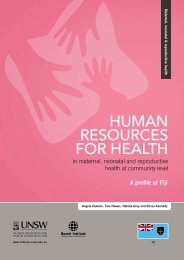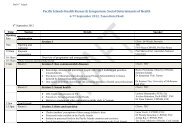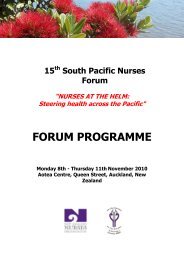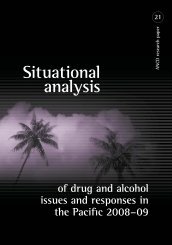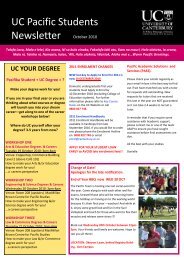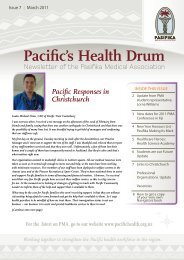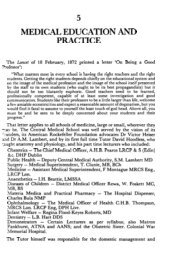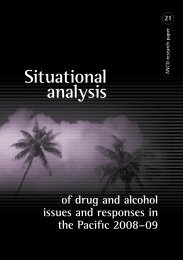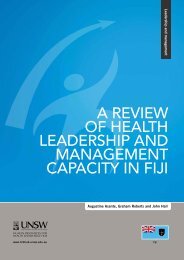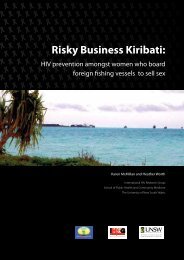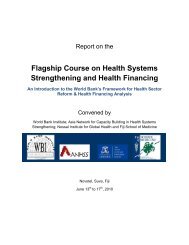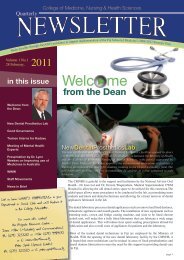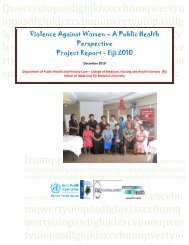Follow this link to download the full report - HRH Knowledge Hub ...
Follow this link to download the full report - HRH Knowledge Hub ...
Follow this link to download the full report - HRH Knowledge Hub ...
Create successful ePaper yourself
Turn your PDF publications into a flip-book with our unique Google optimized e-Paper software.
SECTION 4. NEEDS AND PRIORITIES<br />
Having described a selection of current <strong>HRH</strong> situations,<br />
obstacles, issues and challenges, each country <strong>the</strong>n identified<br />
what <strong>the</strong>y believed was needed <strong>to</strong> help alleviate problems<br />
within <strong>the</strong>ir health sec<strong>to</strong>r. Participants focussed primarily<br />
on two areas – health workforce policy, management and<br />
information; and education and training.<br />
Twelve of <strong>the</strong> 13 countries identified at least one aspect of<br />
health workforce policy, management and information where<br />
it was felt that some sort of action was needed. In one way or<br />
ano<strong>the</strong>r most countries nominated workforce planning as an<br />
area requiring attention. This was followed by management<br />
needs such as addressing leadership issues, streng<strong>the</strong>ning<br />
management skills, and developing policies and procedures<br />
(five countries).<br />
Similar numbers of participants focussed on stakeholder<br />
and donor support, with FSM suggesting <strong>the</strong> World Health<br />
Organization (WHO), Japan International Cooperation Agency<br />
(JICA) or P<strong>HRH</strong>A provide in-service training. Kiribati requested<br />
technical assistance with workforce plan analysis, Vanuatu<br />
stressed <strong>the</strong> need for increased political commitment and<br />
advocacy, and Niue highlighted <strong>the</strong> importance of establishing<br />
a sustainable funding mechanism. Palau identified <strong>the</strong>ir need<br />
for an AusAID volunteer for two years <strong>to</strong> assist in <strong>the</strong> creation<br />
of an <strong>HRH</strong> office staffed with appropriate personnel.<br />
FSM, Samoa and <strong>the</strong> Solomon Islands focused on <strong>the</strong> need<br />
<strong>to</strong> develop reliable information systems, while Tonga and<br />
Vanuatu sought <strong>to</strong> revise regulations, develop competencies<br />
and standards and establish an accreditation mechanism <strong>to</strong><br />
facilitate health worker movement. Remaining needs drew<br />
attention <strong>to</strong> raising <strong>the</strong> age of retirement <strong>to</strong> 60, reviewing<br />
compensation levels, and conducting gap analysis.<br />
Slightly fewer (10 countries) nominated education and training<br />
as an area of need. Five countries focussed on training in<br />
general, drawing attention <strong>to</strong> such issues as <strong>the</strong> need <strong>to</strong><br />
develop programs, <strong>to</strong> build capacity and <strong>to</strong> address an ageing<br />
workforce. Intake numbers were nominated by three countries,<br />
with <strong>the</strong> Cook Islands wanting <strong>to</strong> increase <strong>the</strong> undergraduate<br />
nursing intake <strong>to</strong> 12 per year for five years, and Kiribati hoping<br />
<strong>to</strong> increase its medical assistant intake from 9 <strong>to</strong> 12. The<br />
provision of scholarships, and professional development were<br />
each nominated by three countries. Again <strong>the</strong> Cook Islands<br />
focused on maintaining <strong>the</strong> number of Bachelor of Medicine/<br />
Bachelor of Surgery (MBBS) scholarships at two per year, and<br />
<strong>the</strong> RMI wanting <strong>to</strong> create a scholarship scheme. Finally, RMI<br />
highlighted <strong>the</strong>ir need <strong>to</strong> increase <strong>the</strong> number of nurses at<br />
bachelor and master degree levels.<br />
Participants focussed primarily on two areas<br />
– health workforce policy, management and<br />
information; and education and training.<br />
The issue of pre-service education was identified (again<br />
by three countries) as an important area in need of review.<br />
Upgrading skill levels of students leaving high school and<br />
revising high school curriculum <strong>to</strong> reflect <strong>HRH</strong> course<br />
entry requirements were among <strong>the</strong> needs identified by<br />
RMI, Niue and Samoa. Closely related <strong>to</strong> <strong>the</strong> issue of prevocational<br />
education was that of obtaining support funding for<br />
improvement of high school education and training programs<br />
as suggested by Kiribati.<br />
Not surprisingly, priorities for <strong>the</strong> P<strong>HRH</strong>A <strong>to</strong> assist with<br />
tended <strong>to</strong> mirror <strong>the</strong> needs previously identified, although<br />
greater emphasis was placed on education and training (8<br />
countries) compared <strong>to</strong> policy, management and information<br />
(4 countries). The most distinctive feature, however, was<br />
<strong>the</strong> call for support from P<strong>HRH</strong>A in obtaining technical<br />
assistance (8 countries) and funding (4 countries) in order<br />
<strong>to</strong> fulfil <strong>the</strong>ir education and training, and policy, management<br />
and information needs.<br />
Participants concentrated on <strong>the</strong> need for support in<br />
establishing partnerships, developing networks of local<br />
personnel of member countries <strong>to</strong> assist each o<strong>the</strong>r, and<br />
establishing <strong>link</strong>s with relevant advisory experts, trainers and<br />
resource personnel. Participants also sought assistance in<br />
developing training programs, establishing workforce plans,<br />
carrying out succession planning and establishing standards<br />
and competencies.<br />
Despite six participant countries identifying salary levels and/<br />
or structure as an issue of concern, only three (Fiji, Niue and<br />
Tokelau) made specific reference <strong>to</strong> it in <strong>the</strong>ir needs and<br />
priorities. Given that participants had only a short amount of<br />
time allotted in which <strong>to</strong> outline <strong>the</strong>ir concerns and needs,<br />
as well as limited space (overheads), it could be that <strong>this</strong><br />
issue, and <strong>the</strong> overarching issue of working conditions more<br />
generally, were included within o<strong>the</strong>r categories (for instance<br />
RMI specified <strong>the</strong> more inclusive need <strong>to</strong> develop career<br />
pathways for each health worker). Similarly, in regard <strong>to</strong> <strong>the</strong><br />
issue of migration, only Tonga included it among its needs<br />
and priorities, and <strong>the</strong>n only in a very general manner.<br />
<strong>HRH</strong> issues and challenges in 13 Pacific Islands countries: 2011<br />
Doyle et al.<br />
11



